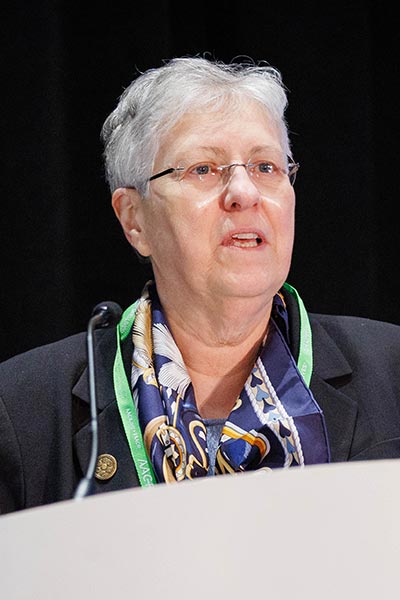Irving Weinstein Foundation award lecturer highlights potential of GLPs in cancer care
Last week marked the 20th anniversary of the U.S. Food and Drug Administration’s (FDA) approval of exenatide (Byetta), the first glucagon-like peptide-1 (GLP-1) receptor agonist to be approved for treating type 2 diabetes. Since then, the FDA has approved other GLP-1 treatments, while many others are in development, and their potential in cancer care was the focus of this year’s AACR-Irving Weinstein Foundation Distinguished Lecture delivered at the AACR Annual Meeting 2025.

“We have an opportunity and a challenge now to figure out exactly what do all these new medicines do. Will they be safe? Will they produce the same benefits? Will they be better for some comorbidities than others or will they produce unexpected liabilities to mitigate some of the benefits we’ve seen with GLP-1 alone?” said Daniel J. Drucker, MD, the recipient of this year’s award and a senior investigator at the Lunenfeld-Tanenbaum Research Institute, which is part of Sinai Health, and a professor of medicine at the University of Toronto, Canada.

The AACR-Irving Weinstein Foundation Distinguished Lectureship was established in 2005 to recognize an individual whose personal innovation in science and position as a thought leader in fields relevant to cancer research has the potential to inspire creative thinking and new directions for cancer research. Its recipient is selected annually by the AACR President. This year, Patricia M. LoRusso, DO, PhD (hc), FAACR, the now AACR Immediate Past President, chose Drucker for his contributions to endocrinology, physiology and metabolism, and the characterization of hormone functionality.
“I selected a scientist whose painstaking work over the years has proven invaluable to the development of new therapeutics for diabetes and other diseases and has profound implications for cancer research,” said LoRusso.
Drucker’s research has been critical to understanding the physiology and metabolism of GLPs, their ability to manage insulin secretion and blood glucose levels, and the mechanism for appetite regulation and nutrient absorption. This research has helped the development of new therapeutics for treating diabetes, obesity, neurodegenerative diseases, short bowel syndrome, and inflammatory bowel and cardiometabolic disorders. Drucker’s work has also been recognized through numerous awards and honors, including the Endocrine Society Fred Conrad Koch Lifetime Achievement Award (2024), Helmholtz Diabetes Center Lifetime Achievement Award (2019), and American Society for Clinical Investigation Harrington Prize for Innovation in Medicine (2017).
“His research, I feel, is the kind that has the potential to inspire creative thinking and new directions in cancer research that will meet the needs and expectations of our patients in the years ahead,” said LoRusso.
Drucker’s lecture discussed how previous and current GLP research outside of cancer could inform and inspire future cancer research efforts. In discussing the benefits of these treatments, he cited a systematic review published in March 2025 on randomized trials of GLP-1 receptor agonists. The analysis found that they reduced the incidence rate for both major adverse cardiovascular events and hospitalization for heart failure by 14%, along with lowering composite kidney outcome (kidney failure, kidney replacement therapy, continued declines in estimated glomerular filtration rate, or kidney-related death) by 17%. All-cause mortality also dropped by 12%.
“Although I’m not an oncologist, [all-cause mortality] is actually my favorite endpoint because it’s binary and unless you are Billy Crystal in “The Princess Bride” or Monty Python, you do not argue about death,” quipped Drucker.
For cancer, Drucker said one future area to consider is research and clinical experience on how GLP-1 receptor agonists impact the tumor. He also shared real-world data that indicated a potential decline in the rates of several cancers with GLP-1 medicines, but noted that both semaglutide (Ozempic, Rybelsus, Wegovy) and tirzepatide (Mounjaro and Zepbound) drugs have only been available for less than four years.
“That’s not enough time with the modern weight-loss medicines to really get enough real-world data with enough events to make conclusions, but it is, I think, fairly intriguing that we’re starting to see rates of many obesity-associated cancers come down clinically as well as in these real-world registries,” said Drucker. Notably, while some preclinical studies showed an increase in thyroid cancers with this class of drugs, Drucker highlighted the fact that mice and rats have GLP receptors on C cells, which is not the case with humans and primates.
Drucker said that there are 60 drugs in this area targeting a range of G-protein coupled receptors that are being investigated in clinical trials. He highlighted some clinical trials testing GLP-1 medicines for cancer that are either recruiting participants or currently planned. For example, an early phase I study is recruiting patients to research whether tirzepatide and semaglutide are feasible for managing weight and blood sugar for endometrial cancer patients undergoing chemotherapy. The phase II TRIM-EBC trial will assess if tirzepatide-induced weight loss will lead to metabolic and hormonal changes in HR-positive, HER2-negative, node-positive, high-risk early breast cancer patients who are obese or overweight, as well as prevent the development of micrometastatic disease and improve distant disease-free survival. Another trial is testing a tirzepatide-based weight-loss program prior to prostatectomy in patients with prostate cancer.
“I expect many more of these trials to be registered and appearing on ClinicalTrials.gov, so hopefully in a couple of years we’ll start to see early evidence for whether intervention in particularly at-risk populations is going to make a difference,” said Drucker.
The recording of the full session is available for registered Annual Meeting attendees through October 2025 on the virtual meeting platform.
More from the AACR Annual Meeting 2025
View a photo gallery of scenes from Chicago, continue the conversation on social media using the hashtag #AACR25, and read more coverage in AACR Annual Meeting News.

